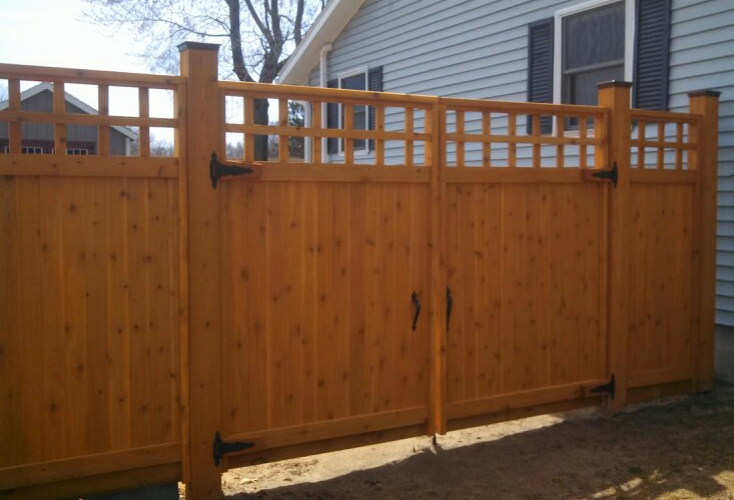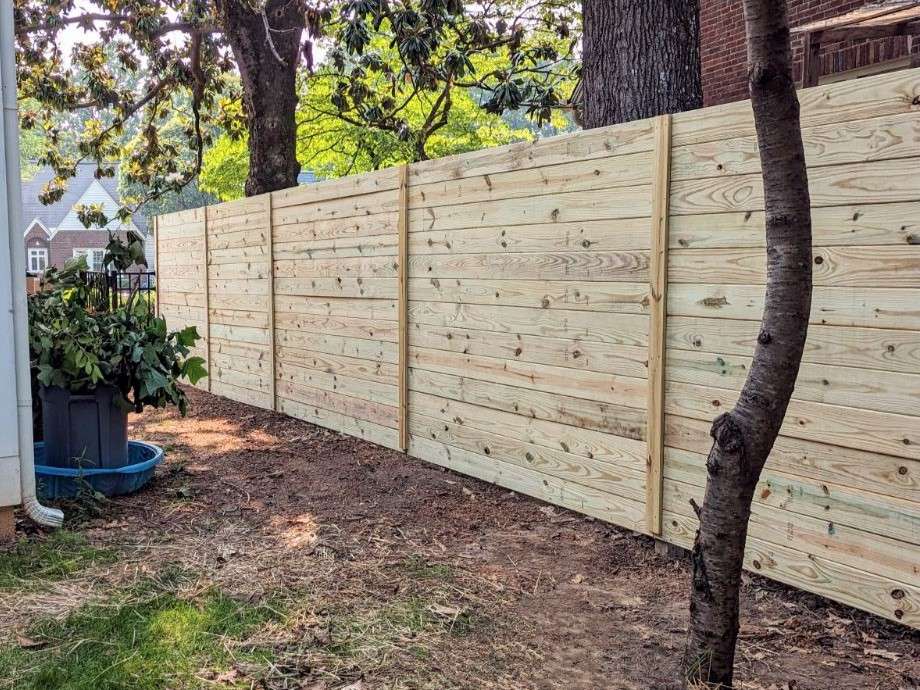All Categories
Featured
Selecting the best sort of fence for your building is a decision that requires thoughtful consideration of a number of factors, from the material and style to its objective and upkeep requirements. A fencing not only serves practical functions such as safety and security and personal privacy but can also enhance the visual appeal of your home. With a range of products offered, it's necessary to comprehend what works best for your certain needs.
![]()
Privacy: If your objective is to obstruct out the view from passersby or neighbors, you'll want a solid fencing without any gaps. Materials like timber, vinyl, and compound are popular choices for privacy fences. They provide the necessary insurance coverage to make certain a remote yard or garden area. Safety and security: For keeping intruders out or securing animals and kids, you'll require a strong, tall fence. Steel fencings such as steel, chain, or light weight aluminum link deal terrific resilience and are challenging to climb up. These materials are likewise ideal for creating a safe and secure boundary around your residential property. Visual Appeal: If the objective of your fence is more attractive than practical, you might select a picket fence, wrought iron, or a split rail fencing. These alternatives provide an eye-catching border without using complete privacy. 2. Consider Your Spending plan. Your spending plan will certainly play a crucial duty in your decision. Different products included differing rate factors, so it's vital to think about how much you're willing to spend. Here are some basic guidelines:
Wood Fencing: One of the most cost-efficient choices, wood fences can be personalized and mounted conveniently, though they require maintenance to stop rot and bending. Routine discoloration or painting is required to keep its look and durability. Plastic Secure fencing: While vinyl is extra pricey upfront than wood, it's a low-maintenance choice. Vinyl fencings don't need paint, discoloration, or securing, and they are resistant to degeneration, fading, and bugs. However, they can be prone to breaking in extreme cool temperature levels. Chain Link Fencing: If your main priority is maintaining costs low, wire mesh fence are the most cost effective option. While they don't use much in regards to personal privacy, they're functional for noting and protecting pet dogs residential or commercial property limits. Steel Fencing (Light Weight Aluminum or Steel): Metal fencings are resilient, durable, and essentially maintenance-free. While they can be pricier than timber or chain link, they supply included safety and security and a streamlined, modern-day look. 3. Resilience and Upkeep Requirements. Think of the lasting resilience of your fence and just how much effort and time you are willing to buy upkeep:
![]()
Timber: While wood uses a natural appearance, it requires routine upkeep, consisting of staining and sealing, to protect it from the aspects. Timber fencings can last 10-15 years with appropriate upkeep. Plastic: Vinyl fencings are low-maintenance and are very long lasting. They won't rot, warp, or discolor over time. Once installed, you can expect a plastic fencing to last for several years with very little care. Metal: Light weight aluminum and steel fencings are extremely sturdy and require little to no maintenance. Light weight aluminum will not corrosion, and steel can be treated with a protective covering to avoid rust. Both options can stand up to severe weather problems and are ideal for long-lasting usage. Chain Link: Although wire mesh fence are long-lasting and strong, they might need routine repairs, especially if the galvanized finishing begins to wear away. They can rust in time, though modern finishings like plastic are offered to prolong the lifespan. 4. Consider Aesthetic Charm. The design and style of the fence ought to match the design of your residential or commercial property. Take into consideration the overall visual you intend to achieve:
Standard Residences: For even more traditional, conventional residential or commercial properties, a wood or wrought iron fence may be the most effective fit. These materials supply a classic appeal and can be customized to match the style of your home. Modern or Contemporary Residences: If you have a contemporary home, you might desire to pick smooth, minimalistic products like light weight aluminum or plastic. These fences offer a tidy look and can be customized with various shades or surfaces. Ranch or Rural Setups: For larger buildings or country setups, split-rail or ranch-style fencings can provide a genuine appearance and are suitable for specifying home limits while still permitting for an open view. 5. Environment Considerations. The environment in your region plays a crucial duty in figuring out the ideal product for your fencing. If you stay in an area with high moisture or hefty rains, wood might warp or rot unless dealt with effectively. Vinyl and steel options, nevertheless, perform well in most climates and are much less vulnerable to damage brought on by moisture.
![]()
Conclusion. Selecting the right fencing for your residential or commercial property depends on comprehending your needs, spending plan, and individual preferences. Whether you're focusing on personal privacy, protection, appearances, or low upkeep, there is a vast range of choices available. By taking into consideration the product, resilience, and style of your fencing, you can ensure that it boosts the feature and appearance of your home for many years to find.

- Examine the Objective of the Fence. The very first step in choosing the perfect fence is comprehending its main feature. The kind of fence you choose will rely on what you wish to accomplish:
Privacy: If your objective is to obstruct out the view from passersby or neighbors, you'll want a solid fencing without any gaps. Materials like timber, vinyl, and compound are popular choices for privacy fences. They provide the necessary insurance coverage to make certain a remote yard or garden area. Safety and security: For keeping intruders out or securing animals and kids, you'll require a strong, tall fence. Steel fencings such as steel, chain, or light weight aluminum link deal terrific resilience and are challenging to climb up. These materials are likewise ideal for creating a safe and secure boundary around your residential property. Visual Appeal: If the objective of your fence is more attractive than practical, you might select a picket fence, wrought iron, or a split rail fencing. These alternatives provide an eye-catching border without using complete privacy. 2. Consider Your Spending plan. Your spending plan will certainly play a crucial duty in your decision. Different products included differing rate factors, so it's vital to think about how much you're willing to spend. Here are some basic guidelines:
Wood Fencing: One of the most cost-efficient choices, wood fences can be personalized and mounted conveniently, though they require maintenance to stop rot and bending. Routine discoloration or painting is required to keep its look and durability. Plastic Secure fencing: While vinyl is extra pricey upfront than wood, it's a low-maintenance choice. Vinyl fencings don't need paint, discoloration, or securing, and they are resistant to degeneration, fading, and bugs. However, they can be prone to breaking in extreme cool temperature levels. Chain Link Fencing: If your main priority is maintaining costs low, wire mesh fence are the most cost effective option. While they don't use much in regards to personal privacy, they're functional for noting and protecting pet dogs residential or commercial property limits. Steel Fencing (Light Weight Aluminum or Steel): Metal fencings are resilient, durable, and essentially maintenance-free. While they can be pricier than timber or chain link, they supply included safety and security and a streamlined, modern-day look. 3. Resilience and Upkeep Requirements. Think of the lasting resilience of your fence and just how much effort and time you are willing to buy upkeep:

Timber: While wood uses a natural appearance, it requires routine upkeep, consisting of staining and sealing, to protect it from the aspects. Timber fencings can last 10-15 years with appropriate upkeep. Plastic: Vinyl fencings are low-maintenance and are very long lasting. They won't rot, warp, or discolor over time. Once installed, you can expect a plastic fencing to last for several years with very little care. Metal: Light weight aluminum and steel fencings are extremely sturdy and require little to no maintenance. Light weight aluminum will not corrosion, and steel can be treated with a protective covering to avoid rust. Both options can stand up to severe weather problems and are ideal for long-lasting usage. Chain Link: Although wire mesh fence are long-lasting and strong, they might need routine repairs, especially if the galvanized finishing begins to wear away. They can rust in time, though modern finishings like plastic are offered to prolong the lifespan. 4. Consider Aesthetic Charm. The design and style of the fence ought to match the design of your residential or commercial property. Take into consideration the overall visual you intend to achieve:
Standard Residences: For even more traditional, conventional residential or commercial properties, a wood or wrought iron fence may be the most effective fit. These materials supply a classic appeal and can be customized to match the style of your home. Modern or Contemporary Residences: If you have a contemporary home, you might desire to pick smooth, minimalistic products like light weight aluminum or plastic. These fences offer a tidy look and can be customized with various shades or surfaces. Ranch or Rural Setups: For larger buildings or country setups, split-rail or ranch-style fencings can provide a genuine appearance and are suitable for specifying home limits while still permitting for an open view. 5. Environment Considerations. The environment in your region plays a crucial duty in figuring out the ideal product for your fencing. If you stay in an area with high moisture or hefty rains, wood might warp or rot unless dealt with effectively. Vinyl and steel options, nevertheless, perform well in most climates and are much less vulnerable to damage brought on by moisture.

- Local Rules and HOA Guidelines. Prior to finalizing your fence option, see to it to get in touch with your neighborhood community or property owners association (HOA) for any restrictions regarding fencing elevation, materials, or style. Several areas have certain guidelines in area, and it is necessary to conform to avoid prospective penalties or needing to tear down the fence.
Conclusion. Selecting the right fencing for your residential or commercial property depends on comprehending your needs, spending plan, and individual preferences. Whether you're focusing on personal privacy, protection, appearances, or low upkeep, there is a vast range of choices available. By taking into consideration the product, resilience, and style of your fencing, you can ensure that it boosts the feature and appearance of your home for many years to find.
Latest Posts
Commemorate Extraordinary Birthdays at FunCity Resort
Published Apr 03, 25
1 min read
Eye Center South - Eye Specialist for Retina Health: Specialized Care Nearby.
Published Apr 02, 25
1 min read
Eye Center South - Nearby Cataract Specialists: Get Back to a Brighter View.
Published Apr 02, 25
2 min read
More
Latest Posts
Commemorate Extraordinary Birthdays at FunCity Resort
Published Apr 03, 25
1 min read
Eye Center South - Eye Specialist for Retina Health: Specialized Care Nearby.
Published Apr 02, 25
1 min read
Eye Center South - Nearby Cataract Specialists: Get Back to a Brighter View.
Published Apr 02, 25
2 min read